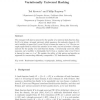Free Online Productivity Tools
i2Speak
i2Symbol
i2OCR
iTex2Img
iWeb2Print
iWeb2Shot
i2Type
iPdf2Split
iPdf2Merge
i2Bopomofo
i2Arabic
i2Style
i2Image
i2PDF
iLatex2Rtf
Sci2ools
IPL
2006
2006
Variationally universal hashing
The strongest well-known measure for the quality of a universal hash-function family H is its being -strongly universal, which measures, for randomly chosen h H, one's inability to guess h(m) even if h(m) is known for some m = m. We give example applications in which this measure is too weak, and we introduce a stronger measure for the quality of a hash-function family, -variationally universal, which measures one's inability to distinguish h(m) from a random value even if h(m) is known for some m = m. We explain the utility of this notion and provide an approach for constructing efficiently computable -VU hash-function families. Key words: Randomized algorithms, cryptography, hashing, universal hashing. 1 Background A hash-function family H = {h: A B} is a collection of hash functions, each h H having the same domain A and codomain B, with B finite. One assumes a hash-function family to be samplable: one can choose a random h from H. Carter and Wegman introduced hash-fun...
Related Content
| Added | 13 Dec 2010 |
| Updated | 13 Dec 2010 |
| Type | Journal |
| Year | 2006 |
| Where | IPL |
| Authors | Ted Krovetz, Phillip Rogaway |
Comments (0)

